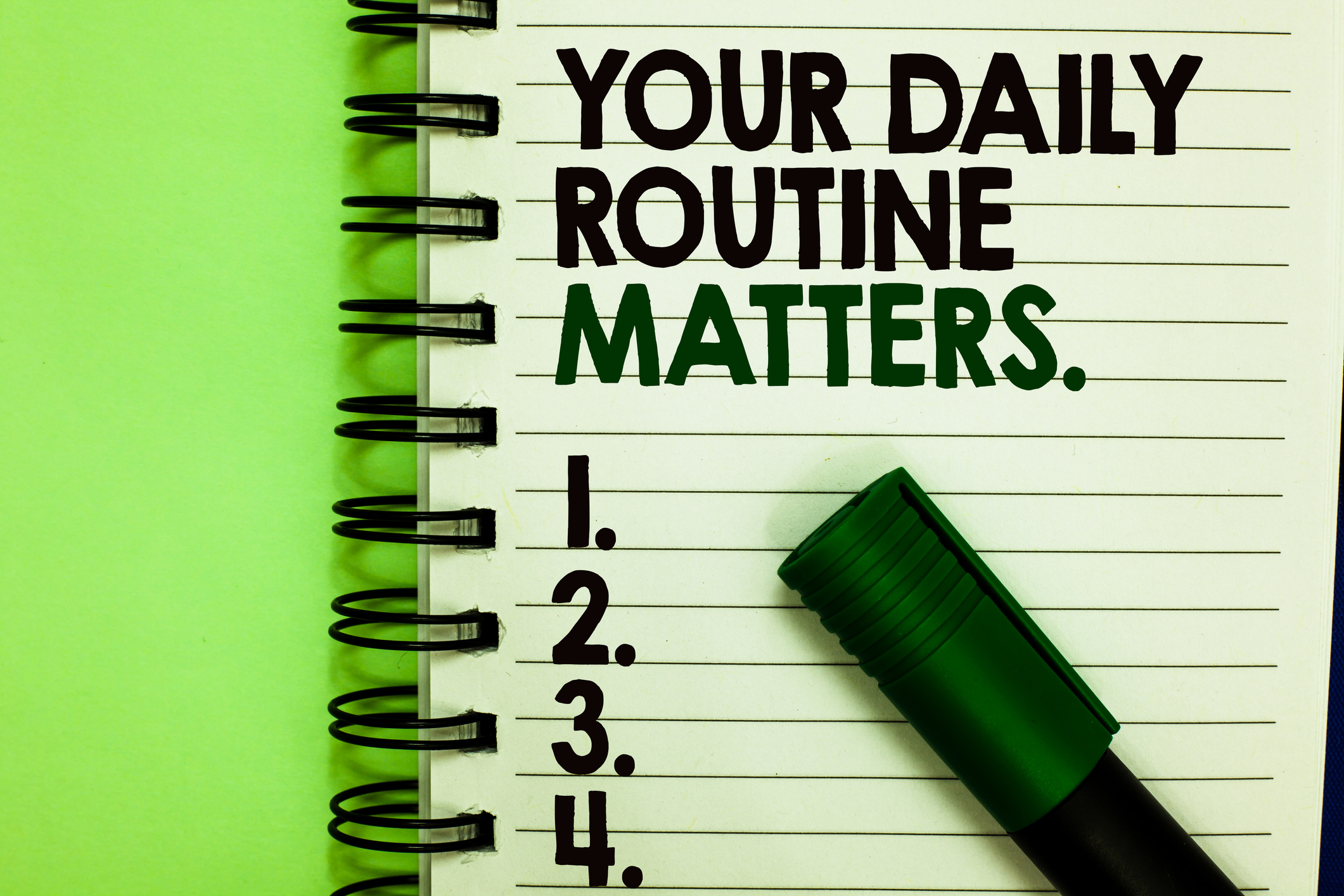Let’s be honest: it’s not always easy getting motivated to exercise at home, particularly if you just don’t enjoy it. Walking to the spare room or garage for a workout can seem like an insurmountable hurdle; yet if the gym was to re-open you may have no issue getting in the car and driving yourself there to do a similar workout.
There are hundreds of good reasons why it’s important to exercise. You are probably already aware of most of these – managing depression and anxiety, fighting off fatigue, improving sleep, enhancing memory, reducing the risk of chronic diseases, just to name a few. But the question is, how do we get motivated, and stay motivated to exercise?
Here are some tips on how to change your mindset and establish your own routine to help you get on track and stay on track!

Create a good daily routine.
With a good routine we are able to seize control of the day and transform those tasks that once required every ounce of our motivation, into actions that become a habit you don’t even need to think about.
Some tips to get you started:
- ‘Win the morning, win the day’. How you start the morning will set the tone for the rest of the day. Schedule some morning exercise. This will improve your mood and get you an early win. You are more likely to stick to a morning routine because the rate at which healthy habits become automatic is greater in the morning; morning is also the time of day when we are least affected by decision fatigue. At the end of a long day most people feel fatigued and quite frankly tired of making decisions, so it is no surprise skipping that late afternoon workout feels like an easy decision.
- Set a pre-game routine. So it’s time to exercise. You’re getting changed into workout gear but start thinking about that cake in the fridge, or how you have never polished your shoes but perhaps now is the perfect time to give it a crack. These distractions come in many forms but can all be addressed by a “pre-game routine.” Establish a unique sequence of events that will help get your mind and body in the zone. For instance, listen to your favourite motivational song whilst putting on your trainers. Do a sequence of stretching exercises to get your body warmed up and ready to move. Regardless of what your pre-game routine looks like, the principles are the same – keep it consistent, use it often, and you will find the transition into regular exercise a lot easier.

Try something new.
We just preached how important routine is, but don’t be afraid to shake up how you are exercising. Stay motivated by being creative. It may be time to change the way you normally exercise. Make a list of different kinds of exercise so that you have a variety of options to choose from to keep you interested and motivated. Many gyms have put exercise content and workouts online that you can do at home. YouTube is also an amazing resource for free, guided exercise routines. A good tip is to save your favourite activities for those days when you really don’t feel like doing anything.
Join a community.
Having a supportive community around your chosen type of exercise can keep you motivated, push you to work out harder, and encourage you to stay committed to your fitness goals. If you don’t have access to humans to sweat with in person, look at joining an online workout community. Exercise-oriented online communities can be the perfect way for you to connect with like-minded people. Try joining or starting your own community Facebook group dedicated to discussion or posting workout videos, photos, or results. Or, if you’re the competitive type, try organising virtual home workouts where you can compete against friends or family. Some gyms are even working out together over Zoom and there are many social networks centered on fitness that, depending on your activities and goals, may be a good fit for you.
Change your self-talk.
Believe it or not, the way you talk to yourself can have a big influence on your performance and whether or not you stick to your exercise plan. That's why it’s important to be aware of the conversations you have with yourself about physical activity and your fitness abilities. Next time you find yourself having negative thoughts about exercise, make an effort to drop the negativity and turn it into positive self-talk. For instance, instead of saying: I didn't go for a jog every day last week. I'm an exercise failure. A more positive alternative would be: I walked 3 out of 7 days last week; some exercise is always better than none.
Make SMART goals.
The fact that goal setting can help with motivation may come as no surprise to many of you, but that is for good reason - it works! Having a solid fitness goal is an amazing way to power you towards success. A SMART goal is one that is specific, easily measured, actionable, realistic, and has a definitive time-frame. For example - to complete 20 push-ups in a row by the end of May. Putting the SMART method into action can help you achieve what you set out to do. It will help keep you on track and remind you of your priorities, so you're able to follow through with every workout or you have planned. Once you have turned your goals into SMART ones, it is time to take it a step further – ‘Ink it, don’t think it’ is the mantra for this step. Studies have shown the importance of writing down and recording your goals. Sport psychologists recommend keeping your goals somewhere you can easily and frequently see them, so don’t be ashamed of your goals, show them off!
If you’re struggling to get motivated and stay motivated to exercise you may benefit from talking to a sport psychologist. Find out more and book an appointment here. Your first session is free!
 Author: Dean Cooper
Author: Dean Cooper
Masters of Psychology (Sport & Exercise) candidate
 Author: Anthony Brace
Author: Anthony Brace
Masters of Psychology (Sport & Exercise) candidate



